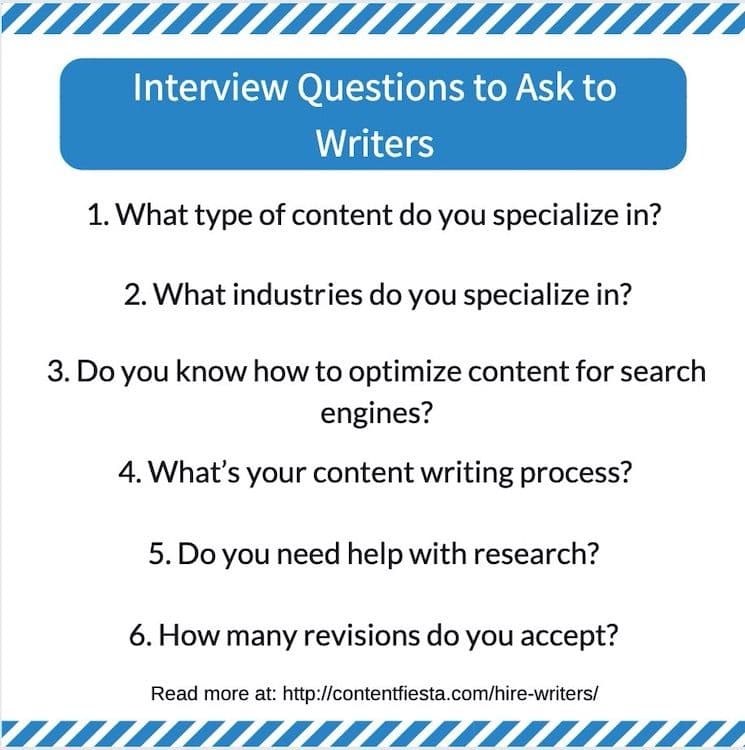How To Choose, Vet and Hire a Content Writer (2026 Guide)
If you want to drive more targeted traffic to your site, you need to hire content writers. You can do it by following these 5 steps.

If you want to drive more targeted traffic to your site, you need to hire content writers. You can do it by following these 5 steps.

Are you looking for writers? There are thousands of available professional writers for hire in Upwork, Fiverr, Freelance.com, and many more content mills and agencies.
It’s easy to hire content writers; there’s little doubt about it. The question is, how can you hire the right freelance writer for your company? What questions should you ask? And how can you tell which ones are the best ones?
In this article, you will learn the answer to all of these questions, and more.
Let’s get started.
☑️ Free Checklist: Download the checklist with the exact steps you need to take to hire top writers for your company.
If you are looking to hire a content writer, you first need to decide whether you want to hire one full-time or as a freelancer. This is no small decision as each type of writer comes with different pros and cons you must analyze.
Let’s take a look at each case.
None of these points mean that a freelance writer won’t be dependable, focused, or invested. The best ones are, which is why they charge what they charge.
From a purely financial standpoint, the costs associated with hiring a full-time writer mean small companies may not benefit from hiring in-house. In this case, you can hire content writers in a contract basis and then move on to hiring one in-house.
In the meantime, let’s just say if you are a small company with a small marketing team, having a full-time writer may not be the best decision you can make. As a recommendation, start with one or two high-quality contractors, and once you find your content is pushing your growth, hire them.
The number one challenge I see when interviewing and hiring writers is to find quality writers, especially in a very specific niche like SEO. You can find great writers and you can find great experts, but it’s really difficult to find someone who is both a skilled writer and an expert in the field.
I have a feeling that too many content writing agencies and freelancers are focused on producing a lot of content but the quality is often questionable.
Freelance writers can provide companies the same quality of content than an in-house one without the costs and risks it entails.
In my experience, after I start working for a company, I write their first article in less than two weeks, progressively taking less time to do so. A full-time writer may need to do a whole lot more work before being ready to publish anything worthwhile.
Larger companies can also benefit from hiring freelancers as long as they know what they need from the writer. If a company expects a freelancer to be held accountable for the whole strategy, it’s likely it won’t work. But if a company knows it needs a landing page or a few articles about a specific topic, a writer can quickly get the job done with little guidance.
Questions to Consider
Action Steps
Writing represents a broad set of skills and specializations. While a writer can write about anything given enough time, it doesn’t mean they can write high-quality content in every format.
You want to hire content writers whose strengths align with your needs. Your writer can be the best landing page copywriter but be mediocre at crafting an interesting story in your articles; the same can be said for many other content types.
For example, I love writing articles and related content like emails and ebooks, but I’m not comfortable writing technical copy because it’s not my specialization. I could do it, but you may not receive the best ROI from my skills.
To analyze a writer’s skills, you must start by looking at what kind of content one can create. This includes:
The best way to assess a writer’s strengths is by looking at their writing portfolio. “Show, don’t tell,” in this context fits perfectly.
Look at what the writer has done in the past; in there, you will find not only what they are most experienced with, but you will also see what they can do with each content type. Find the patterns that you find and base your decision on them.
You can also ask the writer. They will tell you:
Be clear on what you want before you hire content writers. If you want fun and lighthearted content, look for writers that consistently write with those attributes. Take a look at their portfolio and see how they write there. The same applies to specialties; for example, if you want an email writer, look for writers who explicitly say they are good at writing emails.
Having a clear idea of what you want makes the writer’s life easier, and it will create a much seamless experience for both parties.
Questions to Consider
Action Steps
This is one of the most important decisions you must make before you hire content writers. You must know what results you want to get from them and how much these results mean to your business. From there, you can decide how much you are willing to invest in content marketing.
One common mistake many companies make when hiring a content writer is deciding beforehand what their budget is without considering what they can get from a writer at a given price range.
Remember, content on its own is worthless. You want the right kind of content to help you grow your business. Therefore, to hire content writers who are the right fit for your company, you will get a high return on your investment, even if they are expensive.
Here’s a simple set of price thresholds with their respective qualities based on my experience:
While not all writers charge per word—including me—this fundamental analysis will help you get a basic idea of your costs.
For example, if a writer charges $500 for an article of 1,500 words—give it or take 250 words—you find that it will cost you between $0.30 to $0.35 per word.
Also, the more work a writer does, the more they can charge. That includes promoting it and other tasks.
Based on these prices, you need to consider the following aspects of your content strategy:
This is a basic ROI analysis: first, analyze your costs, then your expected results, and see which set of variables work best for you.
Questions to Consider
Action Steps
Once you have found a writer you like, you need to schedule an interview to get to know them better. In the interview, you need to make sure to ask the writer a few questions that will help you understand if it makes sense for both of you to work together.
Before hiring a content writer, you want to ask the following six questions to know whether they are the right person to work with your company.
You don’t need to ask all of the following questions. You can answer some of these questions by looking at the writer’s portfolio and personal site. But I’d recommend you ask at least 3 or 4 of them, just to test the writer and see how they react under pressure.
Writers can write, whether that’s on an email or a Facebook update. But that doesn’t mean the skills of the writers will shine in both mediums. Before hiring a content writer, you want to know what content type they have the most experience on and what content type they prefer.
Cheaper and inexperienced writers tend to fall into the “I’ll do anything for money” trap, resulting in mediocre content for every content type they have to write for.
Remember to play to your writer’s strengths. Even if you end up asking your writer to work on different content types, it’s best if you know beforehand what they can do best with their skills.
Good answer:
Bad answer:
Just as writers work best under different types of content, they also specialize in specific industries. Someone who has little experience in an industry will have a hard time figuring out what to write about because they have to spend more time understanding the nuances of that industry.
To back the writer’s claims, you should also see their portfolio and determine what topics come up the most.
Good answer:
Bad answer:
With this question, you want to see if they know about SEO. You want them to be able to explain and implement optimizations like:
It’s not a big deal if the writer isn’t an expert in SEO. You only want to know if they get the basic concepts of SEO and if they can implement the necessary optimizations themselves.
Good answer:
Bad answer:
The questions I ask depends on what kind of writer am I looking for? Someone for landing pages and promotional material? Social media? White papers? Blogs? It varies as each takes a unique writing skill.
I do ask my writers where they have written before so I can understand their style and see what kind of background they have. I ask to see their portfolio. What writing styles they are comfortable with. How much SEO writing do they have under their belt, and how many years writing. Have they only done long-form writing or short?
Writers have different writing processes, each one with their own way to brainstorm ideas, research, outline, write, and edit their content.
You shouldn’t care much about their processes at the end of the way as long as they develop high-quality content within an acceptable time frame. You just want to understand how they create content, so you know what to expect from your writer.
Good answer:
Bad answer:
All writers research a given topic before they write a single word. If they don’t, run for the hills. Even a writer expert has to research to back up their claims.
What you want to know is they need help with research. If the writer has experience in your industry, they won’t need much help from your end. But in some cases, especially when it comes to developing case studies, ebooks, white papers, and interviews, they may need help. It’s good to know this so you can help your writer.
Good answer:
Bad answer:
Your writers, especially when they first start out working with you, will make mistakes. They will use a tone not appropriate for your company (like the one I’ve just used), or they will link inadvertently to a competitor of yours.
As a consequence, you will have to make edits to the content your writer gives you. The writer knows this, and all of them are willing to accept revisions. What you want to know is how many they like.
Good answer:
Bad answer:
Action Steps

Look for the writer’s past work experiences and writing portfolio. Other than that, I’d love to learn more about their expertise to find out what they’re most comfortable writing about.
It’s still hard to know if a writer is a right fit even when you ask every pre-hiring interview question out there. If I think a writer has the skills and attitude to do a great job, I’d hire him or her for a few writing gigs to find out how he or she works. I’ll also use this opportunity to share how I (and my team) work with writers.
Negotiation is a key skill you need to develop to attract, qualify, and hire content writers. You could negotiate many things with your writers, depending on whether you are hiring an in-house or a freelance writer.
If you are hiring an in-house writer, your negotiations will touch on legal and financial aspects beyond this article’s scope. I’m not an HR expert, so I can’t tell you much about the legal details of hiring a new team member. You can still take some of the insights I’ll show below from hiring a freelance writer.
If you are hiring a freelance writer, the most important aspect you will have to negotiate is the price. I’ve mentioned before how much you can expect to pay for a writer to guide you on your pricing discussions.
However, don’t try to lower the writer’s fees. If they are clear they charge $500 for 1,500 words, then that’s their price. Respect it.
If you want to get a good deal, you can discuss a monthly retainer, where you pay the writer upfront for a few months, and they charge you less per article. That’s a win-win for both parties.
Otherwise, you are simply spitting on their shoes (or hands, in this case). It’s simply wrong to ask for less money just because you feel like it’s too much.
Walk away, baby, or let it be.
Questions to Consider
Action Steps
The content writers you hire are professionals who know what they are doing and need little guidance to do their job. However, this doesn’t mean that they won’t need any help from your end in some cases.
To start, your company is unique. You have a brand that you own and which the writer must represent with their content. Your company’s needs and goals are also different in every way with any other company, so your writer must understand how they can help you achieve them.
For this reason, you can’t expect to hire a content writer and expect them to know everything about you. You must onboard them by:
At first, the writer may also need help to find better topic ideas, craft better stories, and edit the content to make it look like your brand. You will also need to give them feedback on their work.
All this process usually takes place at the beginning of a working relationship. Once you have received the first deliverables, you won’t have to work so close to the writer.
Questions to Consider
Action Steps
Hiring content writers takes time. I know I learned a lot from hiring writers for my projects or companies I worked with, but the more you do it, the easier it will become.
If you follow the advice laid out in this article, you will hire the best content writers for your company.
☑️ Free Checklist: Download the checklist with the exact steps you need to take to hire top writers for your company.

All writers need a writing portfolio. Here’s how you can easily develop one and start attracting top clients — no experience and money needed.

There are hundreds of writing tools you can use in your writing business. In this article, you’ll find the 16 free and paid tools any writer can use.

Are you suffering from writing anxiety? You are not alone. Here’s what you need to do to write without tension or worry.